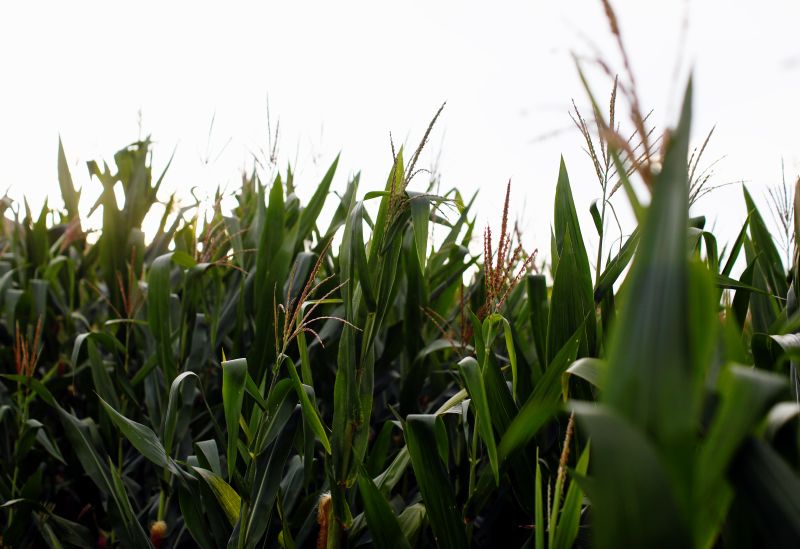By Sharay Angulo
MEXICO CITY (Reuters) - Mexico's most productive farmers fear they may not be able to meet growing demand after state funding cuts, warning of a rising reliance on imports of the white corn used for staples such as tortillas and tamales.
Under President Andres Manuel Lopez Obrador, the agricultural budget has been cropped by a third, with subsidies aimed at larger farmers, who account for two-thirds of corn production, almost entirely eliminated.
Mexico has historically been self-sufficient in white corn, but Jose Cacho, vice president of Grupo Minsa (MX:MINSAB), warns that these changes could force Mexico's second biggest corn flour miller to buy imported supplies in the medium term.
"There's a risk we won't be able to source enough," Cacho said, referring to the 800,000 tonnes Minsa buys annually, adding that it had not bought imported corn for years.
Mexico's agricultural ministry and the president's office did not respond to Reuters requests for comment
Although the government says it considers all farmers important, its agriculture minister said last month that with limited resources available it must prioritize the most vulnerable in the country's many poor rural regions.
Rural poverty has been a driver of immigration to the United States and social unrest for decades and Lopez Obrador, who ran on a pledge of helping the poor, has imposed a sweeping austerity program and tried to reassign resources to tackle it.
The government says new programs supporting smaller farmers with price guarantees will eventually reduce imports.
Mexico City-based GCMA forecasts that white corn production will to dip 3.4% to 23.5 million tonnes this year, before recovering in 2021.
However, the consultancy sees Mexico's overall corn crop only inching up by about a million tonnes by 2024, the last year of Lopez Obrador's term in office. That is far short of demand growth of a million tonnes each year, or about 2.5% annually.
'DISINCENTIVIZING'
Steadily growing use of yellow feed corn to fatten Mexico's livestock has for decades come from cheap U.S. supplies, with imports now making up more than a third of national corn demand.
While this has kept prices down, it has also undercut farmers in Mexico, where leading industry players say subsidy cuts are set to exacerbate the problem.
"Corn is no longer good business because it is cheaper to import," said Juan Pablo Rojas, who heads the National Confederation of Corn Farmers and grows corn himself near the Pacific coast in western Mexico.
"They are disincentivizing national production."
Importing corn for tortillas could potentially make them cheaper, but a decline in national production for a product at the heart of Mexican identity would be a blow to its pride.
Beyond such symbolism, Mexico is still scarred by U.S. President Donald Trump's threat of a tariff war, which led corn importers to reconsider how reliable U.S. supplies were.
"It affects our national sovereignty," said Rojas, adding that when farms fail, workers tend to migrate to look for work in cities or north of the border.
Many support programs have been eliminated, including $300 million to promote exports and subsidies to help farmers pay into a price hedging mechanism, while about $700 million in help for equipment has been cut to $70 million in the 2021 budget.
And without more government support, larger corn farms cannot compete against the U.S. government's aggressive payout schemes for its own corn farmers, Minsa's Cacho said.
The U.S. Department of Agriculture last month released details of a second round of its coronavirus crisis aid for farmers, including an estimated $3.5 billion for corn farmers alone, the American Farm Bureau Federation said.
President Donald Trump and the U.S. Congress have, since late 2018, approved an estimated $61 billion in cash payments and other support efforts for farmers from two main programs, one that aims to cushion losses caused by trade wars, and the other in response to the pandemic.
With yellow corn imports of around $3 billion annually, Mexico is the top destination for U.S. corn. Imports will rise by 5% to 16.2 million tonnes in the 2019/2020 season, agriculture ministry projections show, while white corn imports will jump by 20%, but on much less volume.
The U.S. Department of Agriculture estimates corn supplied to Mexican buyers in 2019/2020 at 18.3 million tonnes.
"We are selling it (corn) at an international price because we compete ... directly with Ohio (and) Minnesota," Rogelio García, a corn and sorghum producer from Tamaulipas in northeastern Mexico said.
'PUNISHING' POLICY
Among Mexico's 2.7 million corn farmers, 90% work plots smaller than 20 hectares and Lopez Obrador has instituted a minimum price guarantee scheme of 5,610 pesos ($248) per tonne in select states for producers who tend up to 5 hectares.
In March, Lopez Obrador authorized less generous price supports for corn farmers with plots up to 50 hectares and produce at most 600 tonnes per year, which are available only in three northern states during the fall-winter harvest.
This is hitting bigger farmers, those who plant 20 hectares or more, who account for more than 70% of domestic production.
"The new policies are punishing farmers with plots larger than 10 hectares," Cesar Quezada, a farmer who produces corn, chicken and meat, said of the ending of policies that once provided a variety of support for farmers with medium or commercial-scale operations.
"We see less appetite ... to increase the hectares to produce corn, soybeans or sorghum because on the one hand the international market (price) is low and on the other they will have higher production costs," Quezada said.
"This threatens food production and food security."
